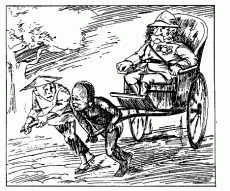Document 1:
"Modern progressive nations lying in the temperate zone seek to control 'garden spots' in the tropics; mainly in Africa, Latin America, and Asia, under the progressive nations direction, these places can yield tropical produce. In return, the progressive nations bring to the people of those garden spots the foodstuffs and manufactures they need.
Progressive nations develop the territory by building roads, canals, railways, and telegraphs. They can establish schools and newspapers for the colonies and give these people the benefit of other blessings of civilization which they have not the means of creating themselves."
Document 1:
Question 1.)
According to the author, what benefits did the colonies receive from the "modern progressive nations"? (list two benefits)
Answer: The English economist, O.
P. Austin (the author) sees imperialism as positive because he claims that the Europeans bring civilization to the primitive societies of the world in the form of education, the building of modern infrastructure, agricultural improvements and consumer goods.
Document 1:
Question 2.)
Which nations does the author probably consider to be the "modern progressive nations" Provide evidence to support your answer.
O.P.
Austin (the author) hints that the modern progressive nations are in Europe by referring to them as being in the temperate zone and through the elimination of those places he calls undeveloped (Africa, Latin America, and Asia) one can discern that he writing about Western European nations as being the progressive nations.
Document 2:
African Proverb
"When the whites came to our country, we had the land and they had the Bible, now we have the Bible and they have the land."
Document 2: African Proverb
Question 1.)
Explain the viewpoint that this proverb express about the white missionaries.
(positive or negative)
The African proverb expresses a negative viewpoint of imperialism because it points to European hypocrisy in using religion as a means to gain trust in order to achieve their ulterior motive of the conquest of African land.
Document 3 : Cartoon
"Learning civilized ways is hard work"
"Learning civilized ways is hard work"
Document 3 : Cartoon
Question 1.) According to the cartoon, how does imperialism affect the lives of native people living under foreign rule?
The cartoon depicts that the native populations of Asia and Africa as having been reduced to menial labor by imperialism. The figures representing Asia and Africa are depicted doing the work of a rickshaw driver while the White European benefits from their labour.
Document 4
"To begin with, there are the exporters and manufacturers of certain goods used in the colonies. The makers of cotton and iron goods have been very much interested in imperialism. Their business interests demand that colonial markets should be opened and developed and that foreign competitors should be shut out. Such aims require political control and imperialism. Finally, the most powerful of all business groups are the bankers.
Banks make loans to colonies and backward countries for building railways and steamship lines. They also make loans to colonial plantation owners, importers, and exporters. The imperialist business interests have powerful allies. Military and naval leaders believe strongly in extending the white man's rule over the 'inferior races,' To this company may be added another element—the missionary. Missionaries went forth to preach a kingdom beyond this world.
But they often found themselves the builders of very earthly empires. . ..Last, but by no means least, let us add politicians to our list of empire builders.
"
Imperialism and World Politics, Parker T. Moore, 1926
Document 4
Question 1.)
Who are the empire builders described in this passage?
According to the historian, Parker T. Moore European empire builders were made up off merchants, investors, bankers, politicians, missionaries and the military.
Document 4
Question 2.)
Based on this passage, explain two ways in which European businesspeople hoped to profit from imperialism.
Business hoped to make a profit in colonies by investing in the development of natural resources to supply factories in Europe. In addition, bankers will profit from by making loans to the colonies for the building of infrastructure and thereby make a profit by charging interest on the loans.
Document 5
" The White Man killed my father, My father was proud. The White Man seduced my mother, My mother was beautiful.
The White Man burnt my brother beneath the noonday sun, My brother was strong. His hands red with black blood The White Man turned to me; And in the Conqueror's voice said, "Boy! a chair, a napkin, a drink. "
An Anthology of West African Verse, David Diop, 1957 .
Document 5
Question 1.)
What were some negative effects of imperialism on Africa?
According to the native African nationalist, Mr. Diop the policy of imperialism has stripped the Africans of their dignity by establishing a system where the conquerors' held all the power.
As a result, Africans have been abused, and reduced to the status of perpetual childhood in their native country.
Document 6
"Colonialism's greatest misdeed was to have tried to strip us of our responsibility in con- ducting our own affairs and convince us that our civilization was nothing less than savagery, thus giving us complexes which led to our being branded as irresponsible and lacking in self-confidence. . . The colonial powers had assimilated each of their colonies into their own economy.
Our continent possesses tremendous reserves of raw material and they, together with its potential sources of power, give it excellent conditions for industrialization. . ."
Sekou Toure, West African nationalist, 1962
Document 6
Question 1.) According to Sekou Toure a West African nationalist, what have the years of colonialism done to Africa?
Sekou Toure claimed that Europeans in stripping Africans of the responsibility of governing themselves and teaching them that their culture was inferior to European culture resulted in Africans losing self confidence in their ability to lead.
The feelings of Europeans has been internalized by the Africans and resulted in a self fulfilling prophesy of dependence.

